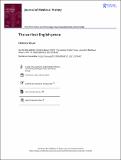Files in this item
The earliest English prose
Item metadata
| dc.contributor.author | Rauer, Christine | |
| dc.date.accessioned | 2021-09-10T14:30:40Z | |
| dc.date.available | 2021-09-10T14:30:40Z | |
| dc.date.issued | 2021 | |
| dc.identifier | 275670054 | |
| dc.identifier | 3c7090b9-f4a5-4e0e-991d-22001891957a | |
| dc.identifier | 000693965700001 | |
| dc.identifier | 85114618231 | |
| dc.identifier.citation | Rauer , C 2021 , ' The earliest English prose ' , Journal of Medieval History , vol. 47 , no. 4-5 , pp. 485-496 . https://doi.org/10.1080/03044181.2021.1974457 | en |
| dc.identifier.issn | 0304-4181 | |
| dc.identifier.other | ORCID: /0000-0002-7593-0152/work/99804159 | |
| dc.identifier.uri | https://hdl.handle.net/10023/23945 | |
| dc.description.abstract | This article examines the production of prose texts in pre-Alfredian England. After reviewing conventional ideas regarding the foundational role assigned to Alfred, king of Wessex, in the creation of the Old English prose genre, the discussion turns to a quite considerable number of non-poetic texts which were demonstrably produced at an earlier time, asking whether these can be regarded as prose. Following an investigation of the medieval and modern understanding of what constitutes prose, an argument is made for a more inclusive definition of this literary genre, one that does justice to the flourishing early literary culture especially of the kingdoms of Mercia and Kent. It is argued that the ninth-century prose productions of Alfred’s circles did present some innovation, but were clearly also based on earlier traditions and may to some extent have reacted against preceding compositional techniques and literary genres. | |
| dc.format.extent | 12 | |
| dc.format.extent | 1239553 | |
| dc.language.iso | eng | |
| dc.relation.ispartof | Journal of Medieval History | en |
| dc.subject | Old English prose | en |
| dc.subject | Alfredian circles | en |
| dc.subject | Trranslation | en |
| dc.subject | Mercia | en |
| dc.subject | Kent | en |
| dc.subject | Glosses | en |
| dc.subject | Latin | en |
| dc.subject | Poetry | en |
| dc.subject | PR English literature | en |
| dc.subject | T-NDAS | en |
| dc.subject.lcc | PR | en |
| dc.title | The earliest English prose | en |
| dc.type | Journal article | en |
| dc.contributor.institution | University of St Andrews. St Andrews Institute of Medieval Studies | en |
| dc.contributor.institution | University of St Andrews. School of English | en |
| dc.identifier.doi | 10.1080/03044181.2021.1974457 | |
| dc.description.status | Peer reviewed | en |
This item appears in the following Collection(s)
Items in the St Andrews Research Repository are protected by copyright, with all rights reserved, unless otherwise indicated.

